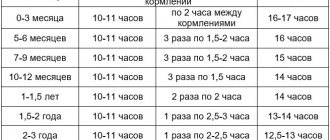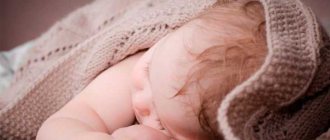The child always has colds! This is fine?
Depends on how sick the child is.
If it is a “regular” cold, without bacterial or fungal complications, then yes, this is normal. Children under five years old get sick more often than older children and adults because their immune system is not yet able to handle the viral load well enough—an average of six to eight times a year. The average period of the disease is from 8 to 14 days. That is, a “normal” child can walk around with severe cold symptoms for several months a year. The main reason for such frequent colds is the viruses around us. The body of a child, which has not yet developed immunity against most diseases, “catches” these viruses much more often than ours, an adult and fully formed one. The good news is that this is a great workout for your baby's immune system. Over time, he will learn to cope with new infections in the early stages and will get sick less often.
Hygiene rules
In order to protect your child from common colds and other infections, it is worth starting to teach him hygiene from a very early age. It is necessary to explain to the child that most often he gets sick precisely because he refuses to wash his hands or picks up dirty objects on the street, and even worse, puts them in his mouth.
All toys and personal belongings of the child must be clean. It is necessary to divide them into those that the child plays on the street, and into items that can only be used at home. Standard hygiene measures (for example, brushing teeth, showering, etc.) should be performed daily.
Why do children start getting sick more often in the garden?
It's simple: the more people there are, the more viruses there are. When attending kindergarten, a child encounters a huge number of new bacteria and viruses and gradually develops immunity to them, that is, he often gets sick. For the same reason, children who have older brothers and sisters get sick more often: they attend children's groups with a large number of people, come home and infect the younger ones.
But frequent colds are still not a reason to avoid people (even if sometimes you really want to). A child growing up in isolation and sterility will be more prone to allergies and autoimmune diseases. And in the end, he won’t avoid his “situated” ARVIs, he’ll just get over them when he gets older.
Don't mess around!
Frequently ill children do not need a special regime; they do not need to be wrapped up and hidden from everything in the world. The child’s immunity needs to be allowed to develop, and this can only be done in one way - by introducing the immune system to the largest number of viruses and bacteria.
Moreover, children get sick more often from excessive heat and stuffiness than from cold, so try to regularly spend time with your child in the fresh air and keep the apartment cool. Don't forget to use a humidifier in your baby's room so that the mucous membranes of your baby's nose and throat don't dry out and become more susceptible to infections.
As for kindergarten, you should not refuse to attend it. If a child suffers from ARVI without complications, let him go to kindergarten. If the baby is forced to take antibiotics month after month, if possible, give the child a vacation for 3–4 months. And then you can go back to the garden.
Do repeated colds affect the nature of complications?
No, complications are not associated with the frequency of ARVI. The cause may be chronic or congenital diseases, or improper and untimely treatment of a cold.
The cause for alarm and, as a result, a serious examination of the child may be regular otitis media (more than eight per year) or pneumonia (more than twice a year).
Or maybe the child has low immunity?
In evidence-based medicine, there is no such thing as “reduced immunity.” There is a medical term for “immunodeficiency”, which develops in patients with HIV infection, those who have had measles or have serious chronic diseases. Congenital immunodeficiency also happens, but this is a very serious condition, which, as a rule, is diagnosed in the first years of life and requires serious treatment.
Serious problems with the immune system manifest themselves not just in the form of frequent colds, but in the form of severe colds with complications, endless bacterial infections, and a tendency to cancer or autoimmune diseases. Therefore, mild colds several times a year are not a sign of problems with the immune system.
Systematic “communication” with the virus
Is it worth it to work so hard on the “frail” immunity?
After all, if a child was born healthy, he was raised in normal conditions: he was properly fed, watered, dressed for the weather, bathed, walked with, then how suddenly did a healthy baby turn into an eternally sick one?
How did it happen that every month the doctor writes on the card the diagnosis “ARVI”, “ARI”?
Why does the runny nose not go away for months and it seems that my son is still coughing a little?
Perhaps the point is not at all that the child is simply “weak,” but that the parents created the wrong conditions for him from the very beginning. And the children’s immunity fought as best they could, but they were tired. Then it’s worth analyzing your life; perhaps one of the reasons listed below occurs in home practice. Then, having eliminated it, the baby will get sick less often.
If a child was born healthy, as evidenced by a discharge from the maternity hospital, but his hospital record is twice as thick as that of his peers, there is only one conclusion - he is affected by an inappropriate environment.
But what should you pay attention to when you get repeated colds?
First, observe the frequency of the disease. For example, a child may have a fever every day every month. If there is periodicity, then it is necessary to exclude the so-called “periodic syndromes”, which are not based on a viral infection, but on hereditary, autoimmune and other causes. As a rule, these conditions are accompanied not only by fever, but also, for example, by severe abdominal pain, rash, and joint pain.
Secondly, a second wave of fever is always suspicious. A cold is usually accompanied by a fever for 1-5 days. The child should definitely be seen by a doctor if he feels better, but after a couple of days the fever reappears - above 38 degrees Celsius. But do not confuse the second wave of fever with residual low-grade fever - sometimes after an acute respiratory viral infection, the temperature can remain up to 37.5 degrees Celsius for another week or two. In this case, if the doctor has ruled out a complicated course of ARVI, there is no reason to worry. And to alleviate the child’s condition with fever, you can use the INVAR KIDS* medical cooling patch. It contains menthol with cooling and soothing effects. The patch is securely fixed on the child’s skin even while sleeping, and it is enough to change it once every ten hours.
Rosehip berry decoction
Finding this plant is not difficult. In almost every summer cottage there is always a large amount of rose hips growing. The berries of this plant have an excellent general strengthening effect. Therefore, decoctions based on them will be useful for a frequently ill child.
It is very easy to prepare such a decoction. However, it can be given to a child in unlimited quantities. But only if he is not allergic to this particular plant. Rose hips contain a large amount of ascorbic acid, essential oils and other components that strengthen the immune system.
In addition, such decoctions are an excellent anti-inflammatory agent. At the same time, they are able to improve the functioning of the gastrointestinal tract. Rosehip decoction can be prepared in any available way, but the easiest way is to brew the berries like regular tea and give it to your baby. The only contraindication can only be if the child is diagnosed with kidney disease. Since rose hips have a diuretic effect, in such situations it will have to be excluded so as not to harm the child.
When should I take my child to kindergarten/school after a cold?
Each parent answers this question for himself, guided by common sense, the advice of a pediatrician and the charter of the kindergarten/school. For example, in European countries and America, a child can return to the children's group if he did not have a fever for 24 hours the day before, and the accompanying symptoms do not prevent him or those around him from leading a normal lifestyle.
And INVAR KIDS products will help relieve the symptoms of a cold so that the child can quickly return to a normal lifestyle. For example, “Propolis with Herbs” marmalade for coughs is suitable for any type of cough and can be used even with prolonged residual cough (which often accompanies repeated colds), “Lozenges for the throat”** will help relieve discomfort in the throat during ARVI, and “Night marshmallow syrup with honey** will become an indispensable aid for frequent night coughs in children.
Overheat
Nowadays, all brochures for new parents write that one of the important components of maintaining a child’s health is temperature control.
In the room where the newborn is located, the temperature must be maintained within 18-22 degrees, as well as optimal air humidity.
Oddly enough, but over time and the child grows up, this rule does not change.
There is also an opinion: for children under one year old in cold weather, dress the baby for a walk in one layer of clothing more than yourself. And older children can already be dressed the same way as themselves. It is recommended to sleep at home not under a wadded blanket, but under a flannel blanket.
Unfortunately, the care of parents and relatives can be too active. The result of this is overheating. In children, it is expressed in the form of prickly heat and red spots; in older children, in addition to these symptoms, the following are also observed:
- lack of appetite;
- thirst;
- lethargy;
- constant fatigue;
- vomit;
- heat.
The above symptoms appear in extreme cases. Most often, the child is unjustifiably warm, but does not reach extremes in the form of fever and vomiting.
The adapting organism gets used to “greenhouse conditions”, which results in illness from the slightest draft.
Are there any ways to avoid recurring colds?
The bad news: there is no magic pill (syrup, ointment, suppository, etc.) that can somehow avoid frequent ARVI. Good news: a healthy lifestyle will help us! Frequent walks and good sleep, a balanced diet, moderate physical activity and lack of stress - all these things available to most of us help not only strengthen the immune system, but also speed up recovery. Don’t forget about hygiene: wash your hands, touch your face less often in public places, teach your children to sneeze “correctly” (into the elbow) and blow their nose.
There is no magic pill
Often parents try to strengthen the immunity of a frequently ill child with the help of various drugs, not always understanding what these drugs are. The magic word “immunomodulators” excites the minds of mothers and fathers, forcing them to look for similar products in the pharmacy. In fact, immunomodulators are used only for the correction of serious immunodeficiencies or hematological diseases after a thorough examination and appointment by an immunologist. There are few children for whom these remedies are indicated, and all of them, as a rule, are observed in specialized centers. Of course, a healthy child does not need such drugs; moreover, they can cause harm.
It’s not worth buying “something for the immune system” at the pharmacy: most of these products are drugs with unproven effectiveness and a high risk of side effects, poorly studied and often banned abroad.
Article on the topic
Snot again! What to do to prevent your child from getting sick in the garden Therefore, it is better to take care of your child’s immunity in other ways. Among them:
Vaccination . Vaccinations will teach the immune system to cope with particularly dangerous infections.
Lifestyle . A balanced diet, adequate sleep, fresh air, no passive smoking, minimizing psychological stress - all this benefits the immune system.
Hardening . Although it will not protect against ARVI, it will reduce the frequency and duration of complications after the disease. And, although today there is not a single hardening method with a fully proven effect, most doctors agree that such procedures can be beneficial for health. Just don’t immediately resort to extreme measures like dousing yourself with ice water or walking barefoot in the snow. Start with cool hand and foot baths, frequent ventilation of the room, and gradually lowering the temperature in the child’s room.
Vitamins and microelements . Improves protection against infections. If your child is often sick, it makes sense to check the level of iron in the blood and, if it is low, start taking appropriate supplements. Pediatricians also recommend that children under 3 years of age take vitamin D. But given the lack of sunlight that every resident of our country faces, supplements with this vitamin can be taken throughout life. As for multivitamins, they are probably useful in the diet, but there is no scientific data confirming that taking such complexes reduces the incidence of ARVI.
Goodbye cold! What is better: medicines or folk remedies? More details
Should you take vitamins?
The decision to take certain vitamins should be made by your pediatrician. There are many multivitamin complexes that promise to strengthen the immune system. At the same time, we can get almost all the necessary vitamins from our diet. But this is not always possible, some vitamins are destroyed during heat treatment: modern pediatricians emphasize the importance of vitamin D for the immune system, so they may recommend taking it additionally.
The information is for educational purposes only, should not be used for self-treatment of diseases, and cannot serve as a substitute for medical advice. *"MEDICAL COOLING PLASTIC" IS A MEDICAL PRODUCT.
** THROAT LOMPES WITH HONEY, MARMALADE “PROPOLIS WITH HERBS”, “NIGHT SMALLHEA SYRUP WITH HONEY” – dietary supplements, ARE NOT MEDICINES, THERE ARE CONTRAINDICATIONS, YOU MUST READ THE INSTRUCTIONS FOR USE.
General strengthening
Herbal medicine, massage and inhalations using various essential oils are very good methods that can not only improve the condition of the child’s immune system, but also calm his nervous system. For example, if you give preference to phytotherapeutic measures, you can add herbal infusions, medicinal teas and essential oils to your baby’s bath.
It would be a good idea to take your child on vacation to a health center. As a rule, such establishments offer a whole list of pleasant procedures that can improve health. The best sanatoriums for children are located on the Black Sea coast. In this case, you can combine business with pleasure. The child will be able to play enough on the beach, attend entertainment events, and then engage in procedures that will help strengthen his immunity.
It is also worth paying attention to traditional medicine methods.










